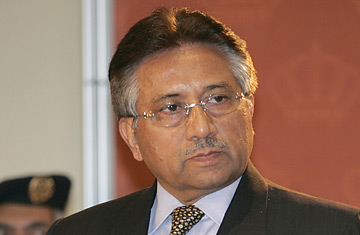
Pervez Musharraf
Nothing tastes so sweet as a long-anticipated homecoming. Former Pakistani Prime Minister Nawaz Sharif hasn't set foot in his native land since 1999, when he chose exile in Saudi Arabia over a life prison term on charges of hijacking then-army chief General Pervez Musharraf's plane. But thanks to a recent ruling by Pakistan's suddenly feisty Supreme Court that Sharif should be allowed to return, the two-time former leader is expected to land in Islamabad on Sept. 10. What happens next is anyone's guess.
President Musharraf, an increasingly beleaguered U.S. ally, is already facing mounting challenges from two very different quarters. Pro-Taliban militants are believed to be behind two suicide bombings in Rawalpindi on Sept. 4 that killed 27 people and are pummeling his security forces in the tribal areas. Meanwhile, the country's judges have been rolling back his edicts following the outrage generated by his attempts to unseat the popular and independent Supreme Court Chief Justice.
Sharif's return has emerged as a wild-card challenge to Musharraf's increasingly unstable political equilibrium. A proposal for Musharraf to share power with Benazir Bhutto, another exiled former Prime Minister, had been intended to restore confidence in the general's rule and ensure him another presidential term when he faces reelection by a parliamentary assembly next month. The proposed deal involved Musharraf allowing Bhutto to return home and run for Prime Minister early next year in exchange for the backing of her powerful Pakistani People's Party (PPP) for his presidential ambitions. In exchange, Bhutto would be allowed to run again for Prime Minister when general elections take place early next year.
But the deal has been widely reviled, and many sticking points could scuttle it. According to the constitution, Musharraf will be prevented from running for another term as President as long as he continues to hold the title of Chief of Army Staff, and the Supreme Court appears unlikely to grant Musharraf another waiver that would allow him to rule in uniform. Bhutto has made the deal conditional on Musharraf quitting the military, but the dictator may be reluctant to surrender what remains the principal source of his authority. The military, however, while losing the presidency, would stand to regain popular support that has been eroded because of Musharraf's ham-fisted attempts to stay in power over the past few years
Whatever the outcome of their negotiation, both Bhutto and Musharraf seem to have overestimated the dictator's popularity. More than a dozen parliamentarians from Musharraf's own party have defected to Sharif's faction, and Bhutto's PPP is also fracturing over the prospect of supporting Musharraf. Even with Bhutto's backing, it is no longer certain that Musharraf could muster the votes to retain the presidency. "He is in a shoestring situation," says Iftikhar Gilani, the former Law Minister under Bhutto. "He needs each vote, and he doesn't have a clear majority. Once he starts counting the votes, he will realize that he will not have enough, and will have to stand down."
A democratic transfer of leadership? Unlikely. Nothing in Musharraf's actions over the past eight years indicate that he is ready to relinquish power just yet. It's just as likely that the general will turn away from messy deals with politicians and simply declare emergency rule. Doing so would allow him to maintain both his titles, and postpone elections for another year. The U.S. has already once persuaded him not to do that, citing concerns about maintaining democracy in Pakistan, but if Musharraf senses his own survival is at stake, Washington's leverage may not be enough to dissuade him from drastic measures. The surge in terror attacks in recent weeks would be taken as pretext by the general for such a move. The repercussions, however, could be devastating. Already, Musharraf's popularity is at an all-time low; declaring emergency rule could drive the country into civil war.
From a U.S. perspective, the choices are grim: Musharraf's tenuous grip on power has eroded his ability to tackle terrorism and extremism, but neither Bhutto nor Sharif would necessarily be a more effective ally in Washington's war on terror. A Bhutto-Musharraf pact would probably further incense militants. Sharif has a better relationship with the religious groups who might rein in the tribal militants, but may be less inclined to do the bidding of the U.S., particularly at a time when being seen to be allied with Washington is a political liability in Pakistan.
The billboards welcoming Sharif home that already line the route from Islamabad's airport signal that Sharif no longer represents just his party, but has become yet another symbol of anti-Musharraf sentiment. Even members of Bhutto's party are planning a rally to welcome their erstwhile foe. "Sharif's return has become a referendum between democracy and dictatorship," says Ahsan Iqbal, information secretary for Sharif's Pakistan Muslim League party. "So by going to support Sharif, you are casting your vote against Musharraf."
He may be mobbed by hundreds of thousands of fans upon his arrival, but Sharif could yet face arrest on long-standing corruption charges. That may not neutralize the threat he represents to Musharraf. "It will further increase his stock," says Iqbal. "This threat of arrest is an indication of how insecure the government is right now."
Sharif has become the spearhead of a burgeoning anti-Musharraf movement, one that will continue to swell no matter what happens. Eight years ago Musharraf overthrew Sharif to popular acclaim. Now the man he supplanted could be the one who will be his undoing. Homecoming is always sweet. But revenge is even sweeter.
